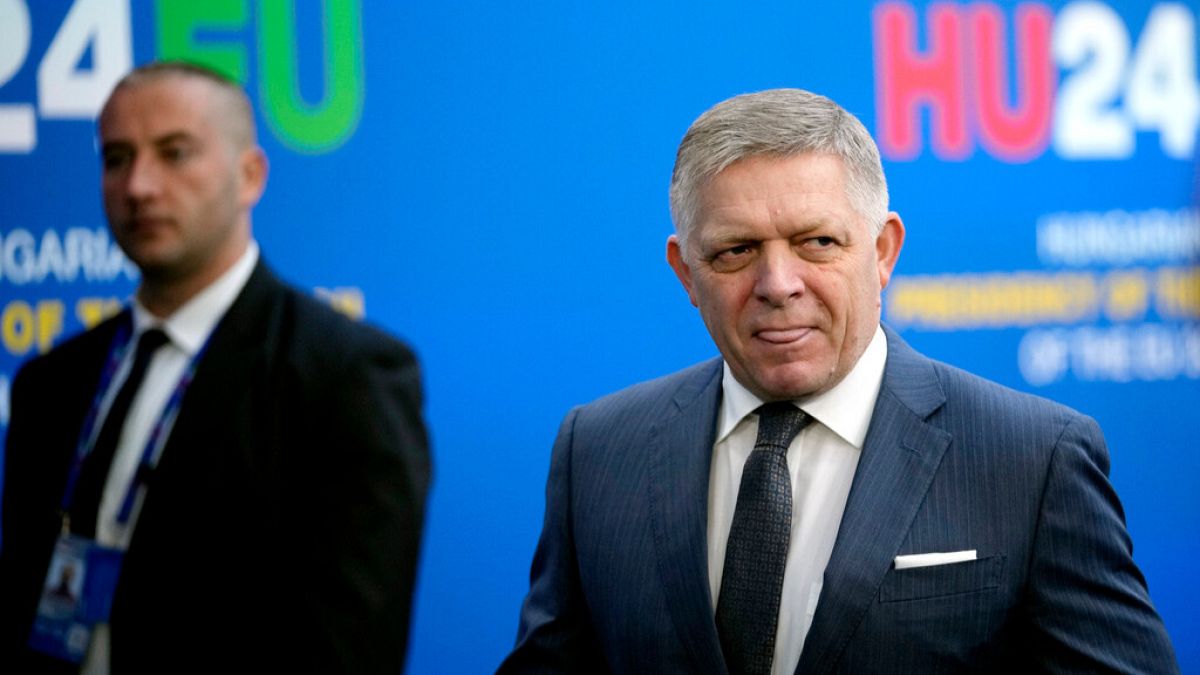Slovak PM Robert Fico said his government was discussing retaliatory measures against Ukraine after Kyiv shut off a pipeline supplying central Europe with Russian natural gas.
Slovakian leader Robert Fico has threatened to cut financial aid for more than 130,000 Ukrainian refugees living in the country as part of a set of retaliatory measures against Ukraine over its decision to halt the flow of Russian gas through its territory to Slovakia.
In a video message posted on Facebook, Fico said his Smer party would also consider cutting electricity supplies to Ukraine and demand the renewal of gas transits or compensation for the financial loss he says Slovakia has taken due to the halting of Russian gas into its territory.
As of 8 December, the United Nations Refugee Agency estimated there were 130,532 Ukrainian refugees in Slovakia with the vast majority directly crossing the shared border between the two countries.
Exports of Russian gas supplies running through a Soviet-era pipeline via Ukraine were halted on New Year’s Day after Kyiv said it would not renew a five-year transit deal with Russian energy giant Gazprom inked before Russia’s full-scale invasion of Ukraine
Slovakia spent months trying to convince Ukrainian President Volodymyr Zelenskyy to renew to deal in order to continue the flow of cheap Russian gas supplies into Europe.
A feud between the two countries has escalated in recent weeks with Zelenkskyy refusing the renew the deal. The Ukrainian leader has argued that he would not allow countries to “earn additional billions on our blood.”
Fico has hit back, saying that halting Russian gas would increase European gas and power prices and ultimately hurt the European Union more than Russia.
He added Slovakia itself wouldn’t suffer from gas shortages as it had made substitute arrangements, but that Ukraine’s decision to shut off Russian gas would still mean losses of €500 million in transit fees from other countries for Bratislava.
Slovakia signed a short-term pilot contract to buy natural gas from Azerbaijan as well as a deal to import US-sourced liquefied natural gas via Poland last year. It’s also able to receive gas through Austrian, Hungarian and Czech pipelines.
Fico has however claimed that the end of the deal would cost the European Union €120 billion over the next two years as a whole.
Officials in Moldova, which is not a European Union member state, declared a state of emergency in December over what it anticipated would be severe gas shortages following the end of the deal.
The European Commission has said that Europe had prepared for the change and most states would be able to manage without Russian gas supplies.
“We expect the impact of the end of transit via Ukraine on the EU’s security of supply to be limited. The 14 billion cubic meters per year currently transiting via Ukraine can be fully replaced by LNG and non-Russian pipeline imports via alternative routes,” a European Commission spokesperson told Euronews in December.
Poland’s government called the end of the deal a “victory” against Russia.
Fico, who has long kept friendly ties with Moscow, much to Ukraine’s dismay, visited Russian President Vladimir Putin last month to discuss gas supplies — where he initiated his threat to halt backup electricity supplies to Kyiv upon which the war-torn country is heavily reliant upon.
At the time, Poland said it would be prepared to boost its energy exports to Ukraine in order to compensate from potential Slovakian losses.
Zelenskyy, for his part, has accused Fico of helping Putin “fund the war and weaken Ukraine”. Last week, the Ukrainian leader said Fico’s efforts to continue the deal amounted to Slovakia opening a “second energy front” against Ukraine on the orders of Russia against Ukraine.

